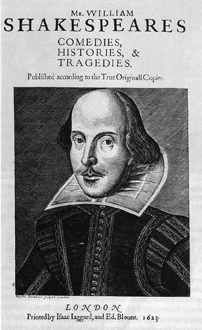Shakespeare’s Use of Songs – Part 1
 |
By Frank Behrens
ART TIMES Sept/ Oct 2010
The authenticity of the songs in Shakespeare’s plays is a question for scholars, not for the casual playgoer. Some of their lyrics, most agree, were created by Shakespeare himself. Others might have already existed and were used, with or without permission, as part of the action. We know that inserting songs into plays had been traditional time out of mind before Shakespeare came along; but to what extent they were used dramatically is quite another story.
A quick glance through my memory reveals that some of his plays have no songs at all: “The Taming of the Shrew,” “Henry V,” and “Titus Andronicus,” for example. That does not mean there never were songs in those plays as performed by Shakespeare’s troupe, only that they did not survive in the texts. In “Henry IV, Part 1,” we see the stage direction “Here the lady sings a Welsh song,” creating something of a problem for directors ever since who had no access to a singer who could do so.
“Twelfth Night” and “As You Like It” come close to being musicals, given the frequency of the songs that pop up all through the text. But it certainly makes sense that the comedies should get several songs, while the histories and tragedies get none or just one or two. But it is the use to which the songs are put that makes an interesting study (I hope), so let us peruse a few examples.
First, songs that merely set a mood.
“Henry VIII,” not entirely by Shakespeare, contains one lovely song, “Orpheus with his lute,” that is sung to Queen Catherine for (it seems to me) the sole purpose of having a song at that point. The lyrics are so impressive that even Arthur Sullivan set it to music; but they seem to have no reference to the situation at that point in the play, except that the Queen asks for a song to cheer her up.
Act IV of “Measure for Measure” opens with the only song in the play, “Take, O, take those lips away.” They are sung by a “Boy” to his mistress Mariana, who is leading a depressed existence since she was abandoned by her lover. The song serves no dramatic purpose, but it beautifully sets the melancholy mood of the scene and of the character.
For all the formal gaiety of the nobles in “Love’s Labor’s Lost,” the single song comes at the end, comparing life in Spring with that in Winter. It might symbolize the happy plot that turns sad only in the last act. Whatever Shakespeare intended, it does seem (at least) to fit just where it is, bringing the play to a bittersweet end.
There are many other examples of songs that set a mood without serving any dramatic purpose. So let us take a look at some that do help the plot along.
The one song, “Who is Sylvia?” in “Two Gentlemen of Verona” is performed under these circumstances. The false Proteus has forsaken his beloved Julia and fallen for his best friend Valentine’s beloved Sylvia. He is also false to the clownish Thurio, who has come to serenade Sylvia. Proteus looks on unseen and Julia in disguise enters also unseen. The lovely lyrics of the song and the lovely music (now lost to us) creates an ironic counterpoint to the feelings of the three characters below the balcony. Dialogue simply would not have worked. In short, this is the first example of a song in Shakespeare’s plays that has a dramatic purpose. Julia is not the same after it as she was before.
Then we have Ariel’s songs and Juno’s aria in the supernatural banquet in “The Tempest.” They certainly contribute to and enhance the magical atmosphere of the play as a whole. But only “While you here do snoring lie” serves the dramatic purpose of waking up Gonzalo and saving his life.
“The Merchant of Venice” has a strange bit of vocalizing that might or might not change events. As Bassanio considers which one of the three caskets to choose, some undesignated person or persons sing “Tell me, where is fancy bred.” It cannot be a coincidence that the last words of the first three lines all rhyme with “lead,” exactly the casket that will make the young man’s fortune.
As Shakespeare matured, he learned to make better use of songs in many of his plays—but not necessarily dramatic use. And that will be considered in the next article.
Comments welcome: fbehrens@ne.rr.com
